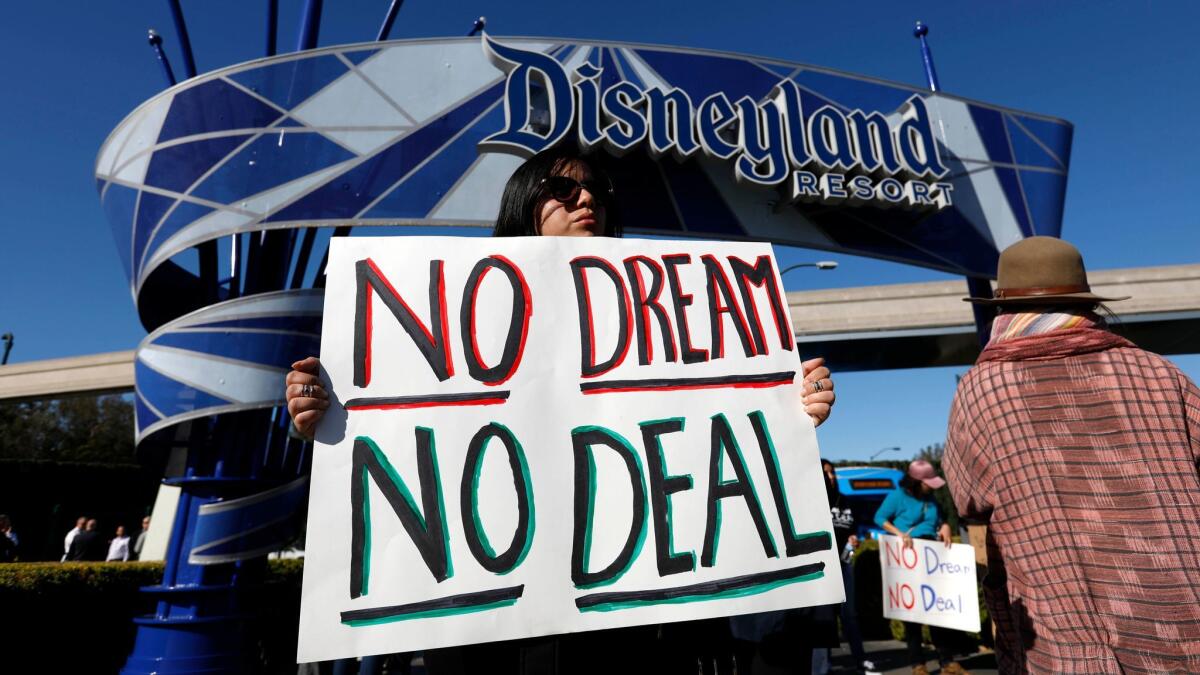Opinion: The great illegal immigration dilemma: Should we do what’s lawful, or what’s humane?

To the editor: Herein lies the conundrum of illegal immigration in the state of California, the central focus of Gustavo Arellano’s Jan. 24 column, “’Felons, Illegals and MS-13 Welcome!’”
On the one hand, you have federal law, which makes clear that it is unlawful for anyone to enter the United States with documentation or without going through the proper channels, period. That’s the law, and it does not imply that as long as one does not get caught entering illegally and does not commit any crimes, one is free to stay.
Legislatures in California may have interpreted or imagined the law as such, but it’s not.
On the other hand, you have humanity. Many of the undocumented immigrants trying to make a living and raise their children in the United States pose no threat or strain really to anyone. As long as they do business honestly, don’t vote and are not on public assistance, it’s easy for us to “look the other way.” In other words, no harm, no foul.
So the dilemma on illegal immigration is between the law and our humanity. It’s a tough call.
Rick Solomon, Lake Balboa
..
To the editor: I taught in the 1980s and ‘90s in Los Angeles public schools. I taught English as a second language and coached soccer.
My soccer team had numerous Salvadorans, Mexican immigrants, a Cambodian goalie who was called “el aguila” [the eagle] by his Latino teammates, a Burmese defender and a Vietnamese left winger (I mean he was playing forward on the left side, not that he was a member of the Viet Cong). All of these immigrants and the few Silver Lake natives on the team learned to work and play together.
They now have great roles in our state. One is a food company executive, and the others include a district attorney, a UCLA hospital administrator and a University of Chicago MBA graduate. They are fathers who have kids in our public schools. They played hard, studied hard, achieved good grades and now are contributing to our society.
To get here, they fled wars and poverty. They were dreamers, but above all, they knew what American education and democracy meant.
David Tokofsky, Los Angeles
..
To the editor: Arellano suggests that the “snowflake white right” needs to recognize and accept sanctuary states and cities. I am appalled that he was allowed to use a “racist remark” so freely.
As a son of immigrant parents, I think Arellano should look further back in our history to understand what it once took to come here.
My grandparents immigrated from Italy in the 1920s. Before they could get permission to take up residency, they had to have a sponsor. They left my father and his two brothers in Italy and could not bring them to the United States until they could prove they were able to support them, which took four years.
My father and uncles arrived during the Great Depression. My father worked as an apprentice during the day and went to night school to study for citizenship. Yes, they were called names and stigmatized.
It is difficult to understand why many supporters of sanctuary cities believe that those entering the United States illegally have the right to be protected and not have to follow the process for gaining citizenship.
Frank Deni, Lake Forest
..
To the editor: Muchas gracias to the Los Angeles Times for putting Arellano’s column on the op-ed page.
He appeals to Latino readers, yes, but his witty and well-written pieces also educate and enlighten us non-Latinos on issues that have not been previously well covered. Case in point: the plight of Salvadoran refugees, the subject of his latest piece.
Art Walsh, Altadena
Follow the Opinion section on Twitter @latimesopinion and Facebook
More to Read
A cure for the common opinion
Get thought-provoking perspectives with our weekly newsletter.
You may occasionally receive promotional content from the Los Angeles Times.










